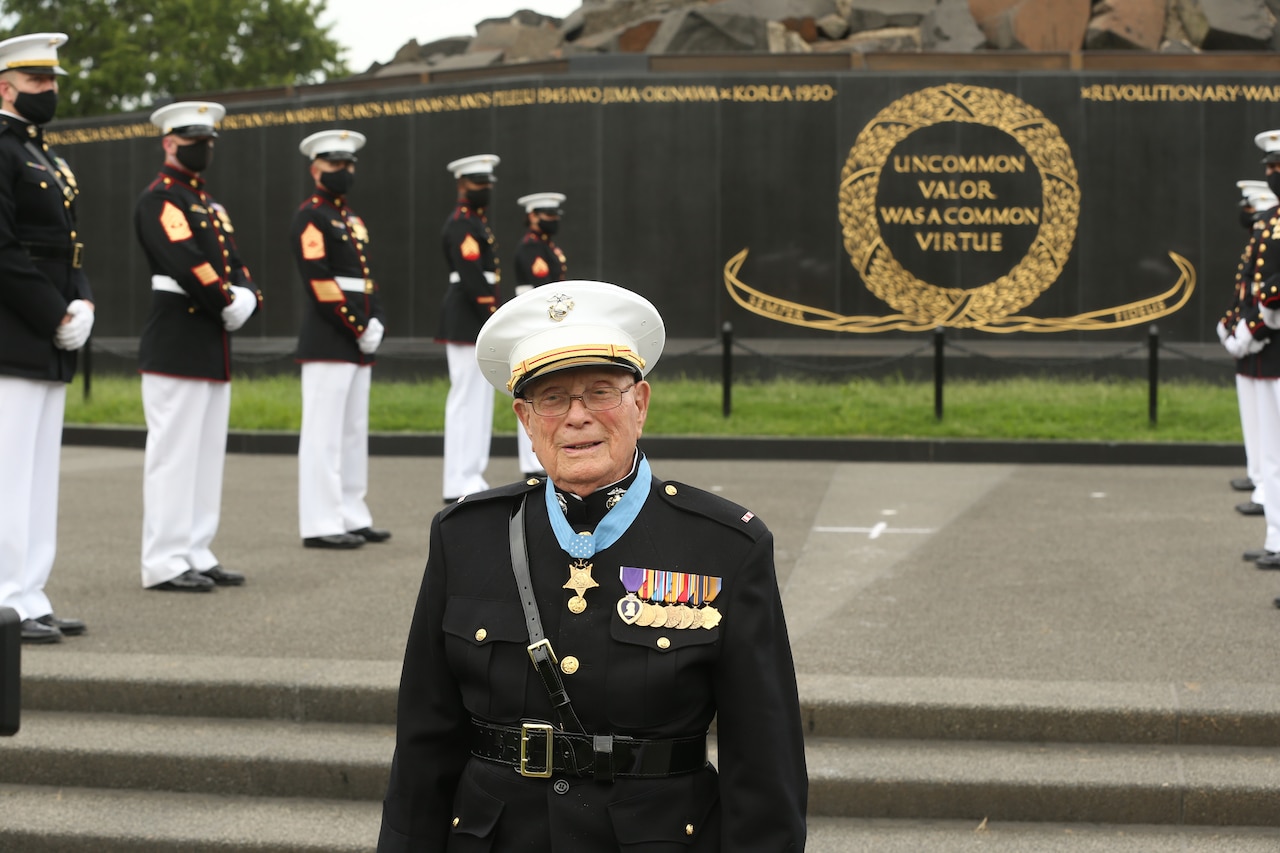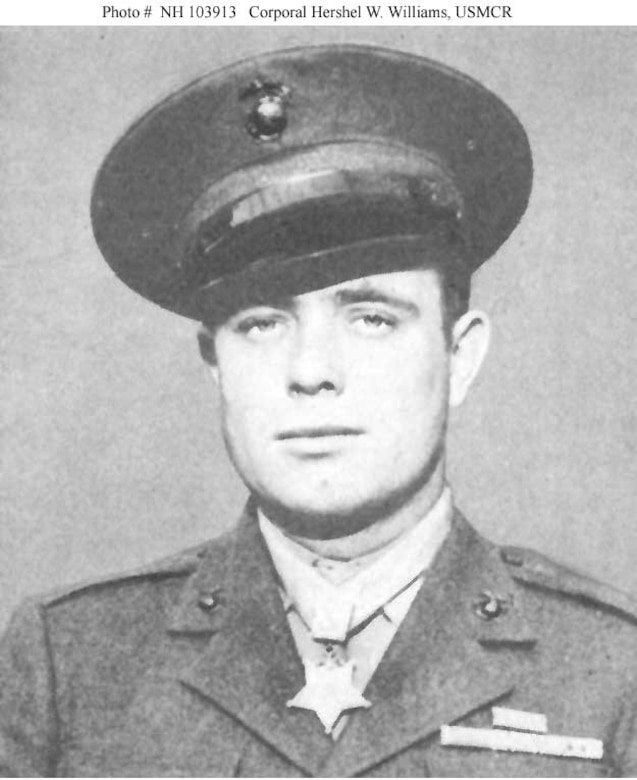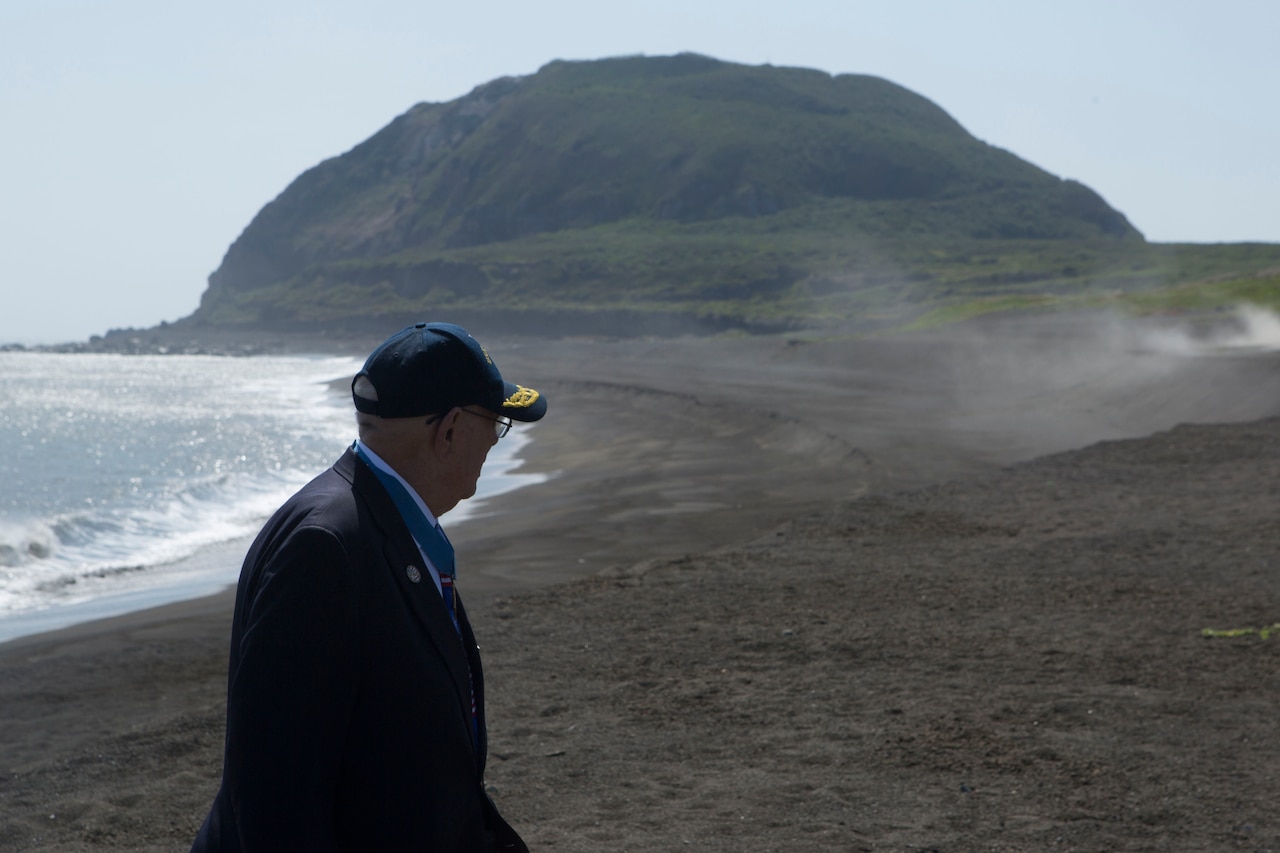Sept. 4, 2020 | , DOD News
As Williams made his way up to the memorial on Sept. 2, scores of Marines snapped to attention, rendering the 96-year-old veteran a heartfelt salute.
Williams joined the Marines in May 1943 and took part in the battle to retake Guam in the summer of 1944 before being sent to Iwo Jima, a tiny island in the Volcano Islands chain. The two were vastly different, he said.

"Guam was more jungle-type fighting — a lot of creeping and crawling — but when we got to Iwo Jima, everything had been wiped off that island," Williams explained in an interview for the Library of Congress' Veterans History Project. "About the only protection you could find would be a shell crater or try to dig your own hole."
Capturing Iwo Jima was crucial to the Allies. The U.S. needed the island's airfields. Other U.S.-occupied islands placed fighter jets out of bomber-escort range of Japan's mainland.
Williams' reserve unit was sent ashore two days after the battle started, and the scene was chaotic. He said they found out quickly that the land was incredibly difficult to maneuver.
The tanks had trouble opening up a lane for the infantry through the black volcanic sand that sloped steeply up the beach from the waterline. But the biggest problem was posed by the many steel-reinforced "pillbox" bunkers protecting the Japanese airfields.
"Bazookas and that sort of thing had no effect on them, because they were so thick and well built," Williams said in a 2017 interview. "The only way to actually eliminate the enemy inside those pillboxes was by flamethrower."
The battle saw heavier than usual casualties. Williams had initially been one of several demolition sergeants, but by Feb. 23, 1945, he was the only one left. So, he bravely volunteered to go forward as the last flamethrower to try to quell the devastating machine-gun fire from the pillboxes.
In four hours, with only four riflemen to protect him, Williams managed to wipe out seven pillboxes. He repeatedly prepared explosives in a safe area, struggled back to where the enemy was, and then set off the charges.
One time, he jumped onto one of the pillboxes from the side and shoved the nozzle of his 70-pound flamethrower into an air vent pipe and fired, killing everyone inside. Another time, he charged bayonet-wielding enemies and killed them with one burst of flame.

"That made a hole big enough that [the company] could go through and get behind any other pillboxes that were in that area," Williams said. "Once you got behind the pillboxes, then we had the advantage."
Williams' efforts helped to neutralize one of the most fanatically defended Japanese strongholds his regiment had encountered. For his actions, he received the Medal of Honor from President Harry S. Truman during a group ceremony at the White House on Oct. 5, 1945. Ten other Marines and two sailors also received the honor that day.
Before Sunset Parade on Sept. 2, Williams made additional remarks about his service and what it means to serve.
When he and his fellow Marines saw the second American flag raised atop Mount Suribachi, Williams said their spirits were lifted. "I still remember that day," he added.
Williams said he's been asked where bravery comes from, particularly about his valorous actions leading to the Medal of Honor.
He said he's never been able to answer that question satisfactorily. "Everybody has some instinct of bravery. And, as long as they can control the fear, you can be brave. But if fear overtakes you and becomes the dominant instinct, you cannot operate. You cannot operate under fear. Your brain won't let you.
"I feel that our upbringing had some influence on our bravery because we were taught in the depression years, if you didn't have it, you had to make it," Williams said. "And the only way you could make it was to work at it. Our upbringing gave us the confidence that developed into bravery."
America was and is worth fighting for, he said. "If we lose our freedom we lose America."
Williams was discharged in 1945, but he stayed in the Marine Corps Reserve until his retirement. Nowadays, he continues to serve through his foundation, the Hershel Woody Williams Medal of Honor Foundation, which honors families who have lost a loved one in service to their country.

Williams said it's those men — the ones who died protecting him — who really deserve the honor.
"This medal doesn't belong to me. It belongs to them because they gave their lives for me," he said, trying to hold back tears. "I was just doing a job that I was trained to do."
Asked what advice he'd give to young people, he said: "If you love America, truly, you are going to have the instinct and desire to serve your country. If you don't, then you're going to find some way to go in the other direction.
"Service is within all of us," he continued. "Every time we do something to help another person, we get a residual of that that makes us feel good, makes us feel proud that we could do something for someone else. And, there's no feeling like it."
In the last few years, Williams observed that Americans have become more separated than at any time since the Civil War. "We must come back together as a nation and as a people to where we can truly say, 'We are the United States of America.'"








No comments:
Post a Comment